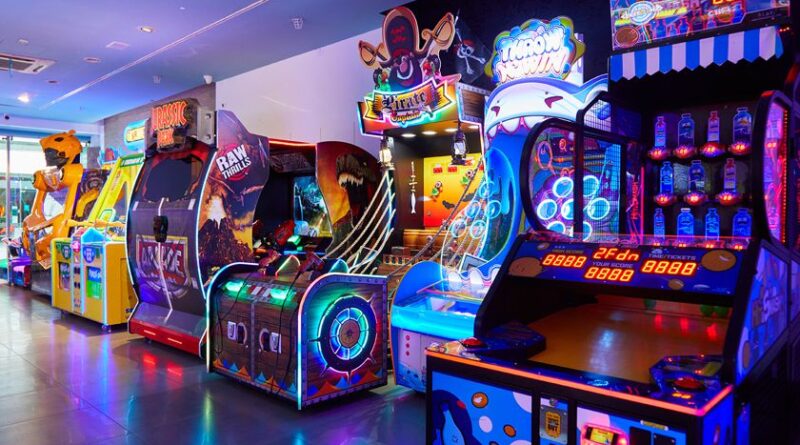The Timeless Allure of Arcade Games
There’s something uniquely captivating about arcade games. Whether it’s the flashing lights, the thrilling sounds, or the simple yet gratifying gameplay, these classic games evoke an undeniable sense of wonder. Long before home consoles and online gaming dominated the industry, arcade games were the beating heart of entertainment hubs worldwide. But their influence didn’t fade with time. Instead, they’ve evolved, adapted, and even surged back into popularity in unexpected ways.
A Blast from the Past
The story of arcade games began in the early 1970s, when iconic titles like Pong laid the groundwork for what would become a decades-long love affair with this form of entertainment. By the late ’70s and early ’80s, arcades had blossomed into vibrant social spaces where gamers gathered to test their skills and rack up high scores.
It wasn’t just about the games; it was a cultural moment that brought people together. Titles like Space Invaders, Pac-Man, and Donkey Kong became household names, ushering in the “Golden Age of Arcades.” For just a few quarters, you could be a space fighter, a dot-eating hero, or an Italian plumber on a rescue mission. The simplicity of the gameplay made these games universally accessible, yet their rising difficulty curve kept players hooked.
The Decline of Arcades
Home gaming consoles like the PlayStation and Nintendo 64 offered immersive experiences right from the comfort of your living room. Why drive to an arcade when you could have a similar experience at home? Additionally, the rise of PC gaming added another layer of competition to the mix.
Many arcades closed their doors, leaving only nostalgia in their wake. Yet, the spirit of arcade games never truly disappeared. Even as technology vaulted forward, the simplicity and charm of these games remained unmatched.
Fast forward to today, and you’ll find that arcade games, in one way or another, have never truly left us.
The Modern Resurgence
Against all odds, arcade games have found a way to adapt to modern times. Part of their resurgence lies in their ability to reinvent themselves while still holding onto their roots. Retro-themed bars and game cafes have started incorporating arcade machines to appeal to a generation longing for a slice of the past. Millennials and Gen Z alike have embraced these spaces, making “barcades” a booming trend.
Additionally, the nostalgic appeal of arcade games extends beyond just physical machines. Remastered versions of classics have found new life on smartphones, PCs, and modern consoles. Who hasn’t spent a few minutes swiping their way through a mobile version of Tetris or Galaga? Tech giants like Nintendo and Sony have made classic arcade titles downloadable, sparking a wave of retro love among gamers of all ages.
Even popular modern games take inspiration from arcade classics. Titles like Cuphead use fast-paced, skill-based gameplay while also mimicking the bold artistic style of early arcade hits.
The Cultural Impact of Arcade Games
Arcade games have left an indelible mark on pop culture. How many movies, TV shows, or books have you encountered where characters are immersed in the glow of a game screen amidst the buzz of other players? Films like The Last Starfighter and TV shows like Stranger Things evoke an iconic nostalgia for these gaming machines.
The influence of arcade games extends to more subtle aspects of entertainment. Leaderboards, for instance, were born out of the arcade experience, where players vied to etch their initials at the top of the game screen. Today, online multiplayer games use similar mechanisms to ignite competition among players worldwide.
Even music has been influenced by this genre. Chiptune, an electronic music style that mimics the sound of old-school arcade systems, has carved out its own place in the music industry, showcasing just how deeply arcade games resonate with people.
Why Arcade Games Still Matter Today
The appeal of arcade games is rooted in their simplicity. Unlike complex games with hours-long tutorials, they offer instant gratification. Press start, and you’re off. With straightforward mechanics and clear goals, they remind players of why they fell in love with gaming in the first place.
Additionally, arcade games represent a social experience. Unlike the solitary nature of online gaming, arcades encouraged face-to-face interaction. Whether it was collaborating with a friend to beat a boss or playfully teasing someone for missing a shot in Basketball Hoops, arcades created lasting memories.
Today, these games bridge generational gaps. Parents who grew up playing titles like Street Fighter II or Asteroids can now share these experiences with their children. And for many, stepping back into an arcade is like stepping into a time machine, reliving the roaring charm of bygone days.
The Future of Arcade Games
Arcade games continue to thrive because they embody both nostalgia and innovation. Some designers are merging VR and AR technologies to create immersive modern arcade experiences. Imagine stepping inside a game where you’re physically dodging obstacles or interacting with virtual characters around you. The industry is also exploring how digital and physical worlds can blend, ensuring that arcade games remain relevant for future generations.
New York Style Pizza Near Me Whether you find them in a neon-lit bar or on your smartphone, arcade games are more than just entertainment. They’re a window into the past, a testament to human creativity, and most importantly, a reminder of how much fun a simple game can bring.
Take a trip to your local arcade or try a remastered classic on your device today. Who knows? You might just rediscover the joy that only arcade games can deliver.



